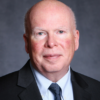Inflation in the United States declined slightly last month to 8.3% annually. But that good news has been short-lived as gas prices—which had momentarily stabilized—have renewed their ascent along with the costs of other goods and services. An unhappy ending resulted from the last bout of U.S. inflation. Four decades ago, the Federal Reserve responded to runaway price hikes by raising interest rates, which triggered an extended recession.
Robert Triest, chair and professor of economics at Northeastern, believes a major recession will be avoided this time. Triest anticipates that decreasing inflation rates will set in over the next two years, based in part on favorable outcomes to the main causes of inflation as he sees it: The COVID-19 pandemic and the Russian war in Ukraine. Both events have caused damage to global supply chains. Actions taken by the Federal Reserve, which is targeting a 2% inflation rate, are also fueling Triest’s optimism. “The economy is starting from a position of strength,” says Triest, a former vice president and economist at the Federal Reserve Bank of Boston, noting that the unemployment rate remains a steady 3.6%.




